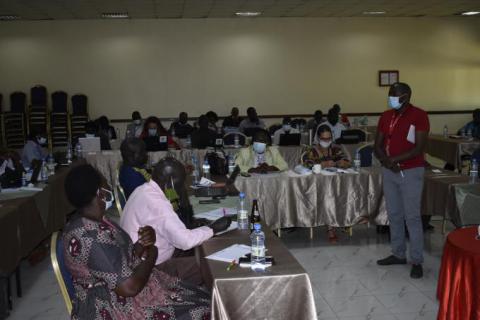Review of ECW's Multi-Year Resilience Programme plan for 2022
Edwin Kimani, MYRP Meal Manager facilitating a session during the workshop. Photo/Daniel Danis/Save the Children
Juba - South Sudan: At least fifty-three partners of the Multi-Year Resilience Programme (MYRP) implementing the Education Cannot Wait (ECW) project are meeting in Juba to reflect and review the progress of the project activities with the goal of enhancing education outcomes in South Sudan.
The stakeholders are also making projections for MYRP Year 3 using lessons from the current year to "ensure every child in the selected locations gets access to inclusive quality education from a safe and protective environment."
The four-day planning workshop also enables partners to mainstream gender-inclusive education, mental health, and psycho-social support to teachers and learners, and to highlight best practices for enhancing quality education in South Sudan.
During the discussions, the partners shared challenges and their projected impact while providing quality education for learners.
Jacobo Masanso, MYRP Education Consortium Manager, and Edwin Kimani, MYRP Meal Manager highlighted best practices from sampled case studies emanating from the implementation of MYRP. The partners are required to document the impact of the project in their program locations.
The partners attending the workshop include OXFAM, AVSI, World Vision, Nile Hope, Peace Corps Organization (PCO), Universal Network for Knowledge and Empowerment Agency (UNKEA), Christian Mission Development (CMD), Mercy Corps, and MYRP Secretariat.
The review meeting was also attending by various Director Generals from the Ministry of General Education and Instruction, among others.
About ECW/MYRP
Education Cannot Wait is the first global multilateral fund dedicated to education in emergencies and protracted crises. Through the South Sudan Multi-Year Resilience Programme (MYRP), ECW project aims at ensuring that out-of-school children (OOSC) in priority areas have flexible, responsive routes into learning opportunities, that support their transition into further levels of education and that support their holistic wellbeing and development. It also focuses on increased access to learning opportunities, improved quality and continuity of education, enhanced school safety, mental health, psycho-social support, gender and inclusive education.
Save the Children International, Norwegian Refugee Council (NRC) and Finn Church Aid (FCA) as grantee agencies work together with 17 Implementing Partners across 6 States in South Sudan – under the leadership of the Ministry of General Education and Instruction.
Story by Daniel Danis/Save the Children
 South Sudan
South Sudan 